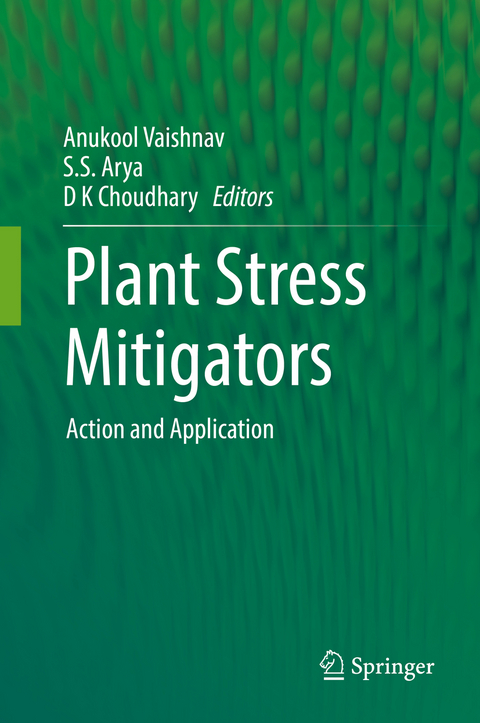
Plant Stress Mitigators
Springer Verlag, Singapore
978-981-16-7758-8 (ISBN)
This edited compilation explores role of climate change in plant stresses, their mitigators, their role, mode of action and, application. The book discusses molecular and physiological mechanisms involved in plant stress physiology and the working mechanism of stress mitigators. It collates information from latest research conducted on plant stress mitigators, and highlights new strategies related to beneficial microorganisms that support plants under various stresses.
These mitigators have gained attention of both farmers and industry for their application in organic farming. Plant stress mitigators have a huge global market. They follow different action mechanism for enhancing plant growth and stress tolerance capacity including nutrient solubilizing and mobilizing, bicontrol activity against plant pathogens, phytohormone production, soil conditioning and many more unrevealed mechanisms.
This book elaborates stress alleviation action of different plant stress mitigators on crops grown under optimal and sub-optimal growing conditions. It addresses mainly three subthemes -- (1) Climate change impacts on plant and soil health (2) Microbe mediated plant stress mitigation and (3) Advances in plant stress mitigation. The book is a relevant reading for Post graduate students, researchers in the field of plant stress physiology, Plant-microbe interaction, biochemistry and plant molecular biology and industries related to seed production, biofertilizer and biopesticides.
Dr. Anukool Vaishnav, is working as a Swiss Excellence Fellow in the University of Zurich, Switzerland, and also associate with GLA University Mathura, India as an Assistant Professor. Dr. S. S. Arya, is working as an Assistant Professor in the Department of Botany, Maharshi Dayanand University (MDU), Rohtak, India. Dr. D. K. Choudhary, is a Member of National Academy of Sciences (MNASc) and is currently working as an Associate Professor in Microbiology at Amity University, Noida.
Chapter 1. Climate change impact on alteration of plant traits.- Chapter 2. Climate change: A key factor for regulating microbial interaction with plants.- Chapter 3. Climate Change and Soil Fertility.- Chapter 4. IMPACTS ON PLANT GROWTH AND DEVELOPMENT UNDER STRESS.- Chapter 5. Consequences of Climate Change over Soil Dynamics: An Update.- 6. Physiological effects of drought stress in plants.- 7. Bioremediation Based Microorganisms Decelerate Due to Climate Change to Breakdown Pollutants.- 8. Impact of climate change on soil microorganisms regulating nutrient transformation.- 9. CLIMATE CHANGE: CURRENT SCENARIO, ITS IMPLICATIONS ON SOIL HEALTH AND MITIGATION.- 10. Habitat Imposed Stress Tolerance by Plants via Soil-Microbe Interactions.- 11. Habitat Imposed Stress Tolerance by Plants via Soil-Microbe Interactions.- 12. IAA biosynthesis in bacteria and its role in plant-microbe interaction for drought stress management.- 13. Role of Plant–microbe interactions in combating salinity stress.- 14. Beneficial rhizobacteria unveiling plant fitness under climate change.- 15. Microorganisms: The viable approach for mitigation of abiotic stress.- 16. Emerging microbe mediated advanced technology to mitigate climatic stresses in plants and soil health: current perspectives and future challenges.- 17. Biotechnological approaches for mitigation and adaptation of climate change.-18. Use of synthetic ecology approach in exploring plant-microbial interactions under habitat-imposed stresses.-19. Drought tolerance mechanisms in crop plants.- 20. MICROBES MEDIATED AMELIORATION OF SALINITY STRESS IN CROPS.- 21. EMERGING TECHNOLOGIES TO UNDERSTAND PLANT‐MICROBE RESPONSES ON CLIMATIC CHANGE.- 22. Functional diversity of microbes in rhizosphere: a key player for soil health conservation under changing climatic conditions.- 23. The Role of Polyamines in Drought Tolerance in Plants.- 24. Portfolio of drought stress response and genetic enhancement strategies for development of future drought-tolerant crop.- 25. ALLEVIATING ABIOTIC STRESS IN PLANTS USING NANOPARTICLES.- 26. Climate change mitigation through agroforestry: socioeconomic and environmental consequences.- 27. An overview on Soybean mosaic virus and its management.- 28. An overview of microbial mediated alleviation of abiotic stresses response in plant.
| Erscheinungsdatum | 11.05.2022 |
|---|---|
| Zusatzinfo | 1 Illustrations, black and white; XI, 596 p. 1 illus. |
| Verlagsort | Singapore |
| Sprache | englisch |
| Maße | 155 x 235 mm |
| Themenwelt | Naturwissenschaften ► Biologie ► Botanik |
| Naturwissenschaften ► Biologie ► Mikrobiologie / Immunologie | |
| Weitere Fachgebiete ► Land- / Forstwirtschaft / Fischerei | |
| Schlagworte | abiotic stress • Agriculturally Important Microorganisms • biotic stress • Green Chemicals • plant ecology • Soil Ecology • Soil Functionality • Stress • sustainable agriculture |
| ISBN-10 | 981-16-7758-1 / 9811677581 |
| ISBN-13 | 978-981-16-7758-8 / 9789811677588 |
| Zustand | Neuware |
| Informationen gemäß Produktsicherheitsverordnung (GPSR) | |
| Haben Sie eine Frage zum Produkt? |
aus dem Bereich


